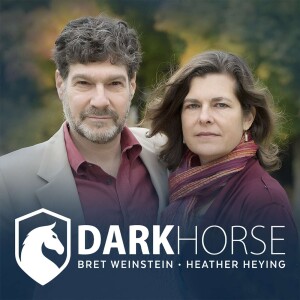
Awe is mysterious. How do we begin to quantify the goose bumps we feel when we see the Grand Canyon, or the utter amazement when we watch a child walk for the first time? How do you put into words the collective effervescence of standing in a crowd and singing in unison, or the wonder you feel while gazing at centuries-old works of art?
In this conversation based on his new book Awe, Dacher Keltner presents a radical investigation and deeply personal inquiry into this elusive emotion. Revealing new research into how awe transforms our brains and bodies, alongside an examination of awe across history, culture, and within his own life during a period of grief, Keltner shows us how cultivating awe in our everyday life leads us to appreciate what is most humane in our human nature. And during a moment in which our world feels more divided than ever before, and more imperiled by crises of different kinds, we are greatly in need of awe. If we open our minds, it is awe that sharpens our reasoning and orients us toward big ideas and new insights, that cools our immune system’s inflammation response and strengthens our bodies. It is awe that activates our inclination to share and create strong networks, to take actions that are good for the natural and social world around us. It is awe that transforms who we are, that inspires the creation of art, music, and religion. Aweis also a field guide for how to place awe as a vital force within our lives.
Shermer and Keltner discuss: the death of his brother and how this led to his study of awe • an operational definition of awe • the reliability (or unreliability) of self-report data in social science • how to quantify and measure the experience of awe • What are emotions and how can they be measured? • How has the scientific understanding of emotions changed? • predictors of awe: nature, music, art, dance, movement/exercise, love & friendships • awe in moral beauty • how to train yourself to experience awe • how awe helps heal traumas, grief, and loneliness • mystical experiences, spirituality, and awe restorative justice and awe.
Dacher Keltner is a professor of psychology at the University of California, Berkeley, and the faculty director of UC Berkeley’s Greater Good Science Center. A renowned expert in the science of human emotion, Dr. Keltner studies compassion and awe, how we express emotion, and how emotions guide our moral identities and search for meaning. His research interests also span issues of power, status, inequality, and social class. He is the author of The Power Paradox and the bestselling book Born to Be Good, and the coeditor of The Compassionate Instinct. His new book is Awe: The New Science of Everyday Wonder and How it Can Transform Your Life.
More Episodes
344. What is a Woman, Anyway?
 2023-04-26
2023-04-26
343. Timothy Redmond — Political Tribalism in America: How Hyper-Partisanship Dumbs Down Democracy and How to Fix It
 2023-04-25
2023-04-25
342. Valerie Fridland — Like, Literally, Dude: Arguing for the Good in Bad English
 2023-04-22
2023-04-22
341. Secret Scientists & Real Conspiracies — John Lisle on Stanley Lovell, the OSS precursor to the CIA, and the Masterminds of World War II Secret Warfare
 2023-04-18
2023-04-18
340. Ben Alderson-Day — Presence: The Strange Science and True Stories of the Unseen Other
 2023-04-15
2023-04-15
339. Gerald and Patricia Posner on Evil
 2023-04-11
2023-04-11
338. AI SciFi — Physicist, Science Fiction Author, and AI Expert David Brin on ChatGPT and Whether AI Poses an Existential Threat
 2023-04-08
2023-04-08
337. On the Origin of Time — Thomas Hertog on Stephen Hawking’s Final Theory
 2023-04-01
2023-04-01
336. The Sacred Depths of Nature — Ursula Goodenough on How to Find Sacred Scientific Spirituality
 2023-03-28
2023-03-28
335. Jennifer Michael Hecht on How to Find Meaning, Purpose, and Happiness in Everyday Life
 2023-03-25
2023-03-25
334. The End of the World: Bart Ehrman on What the Bible Really Says About the End
 2023-03-21
2023-03-21
333. Kevin Kelly — ChatGPT, OpenAI, and Excellent Advice for Living
 2023-03-18
2023-03-18
332. Wrongfully Convicted, Ultimately Acquitted — Amanda Knox on Criminal Injustice and Why It Happens
 2023-03-14
2023-03-14
331. Paul Zak — Immersion: The Science of the Extraordinary and the Source of Happiness
 2023-03-11
2023-03-11
330. Jim Davies — How to Be a Better Person
 2023-03-07
2023-03-07
329. Marc Schulz — The Good Life: Lessons from the World’s Longest Scientific Study of Happiness
 2023-03-04
2023-03-04
328. Paul Bloom — Psych: The Story of the Human Mind
 2023-02-28
2023-02-28
327. Rachel Moran on Her Years in Prostitution, How She Got Out of It, and Why She Thinks It Is a Form of Sexual Exploitation
 2023-02-25
2023-02-25
326. Naomi Oreskes — The Big Myth: How American Business Taught Us to Loathe Government and Love the Free Market
 2023-02-21
2023-02-21
325. Heinrich Päs — The One: How an Ancient Idea Holds the Future of Physics
 2023-02-18
2023-02-18
Create your
podcast in
minutes
- Full-featured podcast site
- Unlimited storage and bandwidth
- Comprehensive podcast stats
- Distribute to Apple Podcasts, Spotify, and more
- Make money with your podcast
It is Free
You may also like

Sasquatch Chronicles


Radiolab


The Confessionals


DarkHorse Podcast


Sasquatch Odyssey


- Privacy Policy
- Cookie Policy
- Terms of Use
- Consent Preferences
- Copyright © 2015-2024 Podbean.com


 iOS
iOS Android
Android